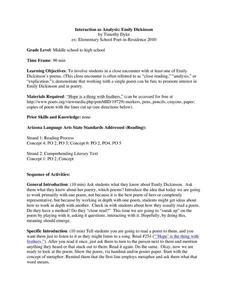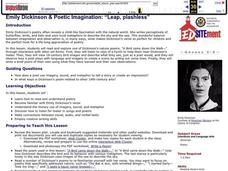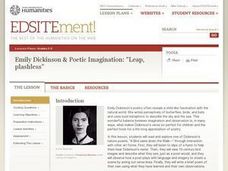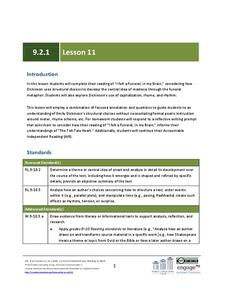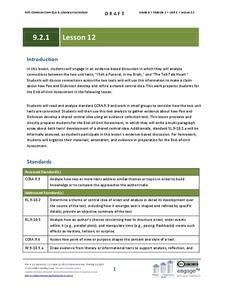Curated OER
Letters from Emily Dickinson: Letters and Poems
Students analyze how Emily Dickinson perceived herself as a poet. Students read correspondence between Dickinson and her preceptor, Mr. Higginson to determine the depths of their relationship. Students interpret several of her poems.
Academy of American Poets
Teach This Poem: “One day is there of the series” by Emily Dickinson
A activity begins with learners saying three words they associate with Thanksgiving dinner. They examine a picture of a menu from a Thanksgiving meal and discuss what they believe the artist wants them to feel, pointing out details....
Curated OER
"Leap, plashless": Emily Dickinson & Poetic Imagination
Students examine different poems from Emily Dickinson. They practice listening for meter in the poems and make connections between the texts. They also practice their own creative writing skills.
National Endowment for the Humanities
In Emily Dickinson's Own Words: Letters and Poems
Analyze the depth and beauty of American Literature by reading Emily Dickinson's letters and poems. The class analyzes Dickinson's poetic style and discusses Thomas Wentworth Higginson's editorial relationship with Dickinson. They pay...
National Endowment for the Humanities
Emulating Emily Dickinson: Poetry Writing
High schoolers analyze mood and voice in Emily Dickinson's poem, "There's a Certain Slant of Light." After the analysis, students write a poem of their own emulating the Dickinson poem, and then write a one-page essay describing what...
Curated OER
Emily Dickinson Poetry
Students identify a poem by Emily Dickinson for analysis. They apply a set of critical questions to a poem in order to interpret poem and find literary elements used by author. They organize information for a PowerPoint presentation...
Curated OER
Landscapes of the Mind
High schoolers review Emily Dickinson's biography and examine themes and forms of some of her poems. They measure ways Graham integrates aspects of Dickinson's life and the themes and forms of her poetry into Letters to the World.
Curated OER
Interaction as Analysis: Emily Dickinson
Emily Dickinson’s “Hope is a thing with feathers” is the focus of a series of activities that model for learners how close reading can lead to understanding. The whole class plays with the metaphor, groups talk about the author’s...
Curated OER
"Leap, Plashless": Emily Dickinson & Poetic Imagination
Students read and explore one of Emily Dickinson's nature poems, "A Bird Came Down the Walk-" through interaction with a variety of art forms. Clips of a hymn to hear meter and the viewing of bird images exposes them to the language and...
National Endowment for the Humanities
Responding to Emily Dickinson: Poetic Analysis
Learners explore Emily Dickinson's poem "Safe in Their Alabaster Chambers." In this Dickinson poem lesson, students analyze the poem as proof of Dickinson' awareness of her reader. Learners analyze her style and identify her editorial...
Curated OER
Emily Dickinson & Poetic Imagination: "Leap, plashless"
Students analyze the poems of Emily Dickinson and write their own nature poem. In this poetry analysis lesson, students read Dickinson poetry and analyze the use of imagery, sound, and metaphor. Students write their own nature poem using...
Curated OER
Poetry: An investigation of Life
AP English Language and Composition requires that class members be able to formulate an argument and support it. Use this resource to focus on the life of Emily Dickinson. It requires individuals to research her life and make inferences...
Weber County Library
Abstract Ideas Explored: Writing with Extended Metaphor
A 25-page packet includes eight detailed lesson plans centered around poems by Emily Dickinson. Each instructional activity begins with a burning question that students attempt to answer by using evidence from Dickinson's poems.
Curated OER
The Life and Poems of Emily Dickinson
Learners explore Emily Dickinson and her poetry. In this Emily Dickinson instructional activity, students study photos and characteristics of Emily Dickinson. Learners read and identify key themes in her poetry.
EngageNY
Grade 9 ELA Module 2: Unit 1, Lesson 9
Continue analyzing literature using textual evidence with a lesson on "I Felt A Funeral, in my Brain" by Emily Dickinson. Ninth graders bring their annotation skills and knowledge of figurative language from the previous eight sessions...
Curated OER
Making Poetry Writing Fun!
Students find a group of words from an unlikely source and turn them into a poem. They discuss the central image in two well-known poems by Langston Hughes and Emily Dickinson. They write their own short poem expressing one central...
Curated OER
Emily Dickinson: Luminous Letters
Students analyze the dimensions of Emily Dickinson's poetry and persona. For this Emily Dickinson lesson, students read the example letters and analyze a chart of the poems. Students present their findings from the poems in a presentation.
EngageNY
Grade 9 ELA Module 2: Unit 1, Lesson 11
The capitalization rules are strict and inflexible—until you experience the fluid beauty of an Emily Dickinson poem. Ninth graders test their existing knowledge of language arts conventions with the many bent grammar rules in "I Felt a...
EngageNY
Grade 9 ELA Module 2: Unit 1, Lesson 10
An engaging unit connects Edgar Allan Poe and Emily Dickinson's shared themes of madness and departure from reality. The 10th lesson in the unit explores Dickinson's figurative language and structure choices in "I Felt a Funeral, in my...
EngageNY
Grade 9 ELA Module 2: Unit 1, Lesson 13
Whether the planks hide the beating of a hideous heart or they break away to the madness beneath, their presence makes itself known in the final instructional activity of a literary analysis unit. Having gathered textual evidence from...
EngageNY
Grade 9 ELA Module 2: Unit 1, Lesson 12
What happens when a tenuous grasp on sanity begins to slip? Compare Edgar Allan Poe's "The Tell-Tale Heart" and Emily Dickinson's "I Felt a Funeral, in my Brain" with a lesson plan focused on developing a common central idea. High...
Prestwick House
"Because I could not stop for Death" -- Visualizing Meaning and Tone
Emily Dickinson's "Because I could not stop for Death" provides high schoolers with an opportunity to practice their critical thinking skills. They examine the images, diction, rhythm, and rhyme scheme the poet uses and consider how...
Curated OER
Editing Emily's Way: An Exercise in Diction and Its Implications
Students examine the poetry of Emily Dickinson and the diction in her poetry. In this poetry analysis lesson plan, students read Dickinson poetry and analyze the diction in the poems. Students journal about the poetry and rewrite their...
Curated OER
Imagery and Emily Dickinson
Seventh graders explore imagery, particularly in relation to figurative language.
Other popular searches
- Emily Dickinson Powerpoint
- Emily Dickinson Poetry
- Emily Dickinson Analysis
- Emily Dickinson and Music
- Emily Dickinson Web Quest
- Emily Dickinson Childhood
- Emily Dickinson, Slant Rhyme
- Emily Dickinson Webquest
- Emily Dickinson Lesson Plans
- Emily Dickinson Slant Rhyme









